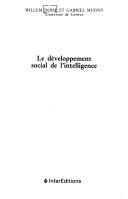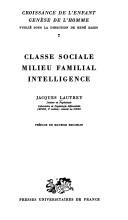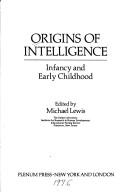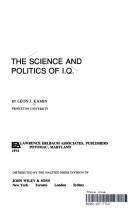| Listing 1 - 7 of 7 |
Sort by
|
Book
ISBN: 9780956881175 0956881173 Year: 2012 Publisher: London: Ulster Institute for Social Research,
Abstract | Keywords | Export | Availability | Bookmark
 Loading...
Loading...Choose an application
- Reference Manager
- EndNote
- RefWorks (Direct export to RefWorks)
Intellect --- Social aspects --- Cross-cultural studies --- Human intelligence --- Intelligence --- Mind --- Ability --- Psychology --- Thought and thinking --- Intellect - Social aspects --- Intellect - Cross-cultural studies

ISBN: 2729600922 9782729600921 Year: 1981 Publisher: Paris : InterEditions,
Abstract | Keywords | Export | Availability | Bookmark
 Loading...
Loading...Choose an application
- Reference Manager
- EndNote
- RefWorks (Direct export to RefWorks)
Intellect --- Cognition in children --- Social interaction in children --- Intelligence --- Cognition chez l'enfant --- Interaction sociale chez l'enfant --- Social aspects --- Aspect social --- Cognition in children. --- Social interaction in children. --- Social aspects. --- Intellect - Social aspects

ISBN: 2130362001 9782130362005 Year: 1980 Volume: 7 Publisher: Paris: PUF,
Abstract | Keywords | Export | Availability | Bookmark
 Loading...
Loading...Choose an application
- Reference Manager
- EndNote
- RefWorks (Direct export to RefWorks)
Social stratification --- Developmental psychology --- Social psychology --- Children --- Intellect --- Families --- Intelligence levels --- Social aspects --- Classe sociale --- Social classes --- Capacité mentale --- Mental ability --- Famille --- Sociologie --- Sociology --- Développement de l'enfant --- child development --- Apprentissage --- Learning --- Families. --- Ontwikkelingspsychologie --- Intelligence levels. --- Social aspects. --- sociale en morele ontwikkeling --- Family. --- sociale en morele ontwikkeling. --- Sociale en morele ontwikkeling. --- Children - Intelligence levels --- Intellect - Social aspects

ISBN: 0306308673 1468469630 1468469614 9780306308673 Year: 1976 Publisher: New York (N.Y.): Plenum,
Abstract | Keywords | Export | Availability | Bookmark
 Loading...
Loading...Choose an application
- Reference Manager
- EndNote
- RefWorks (Direct export to RefWorks)
Intellect --- Infant psychology --- Children --- Cognition in children --- Cognition in infants --- Intelligence tests --- Social aspects --- Intelligence levels --- In infancy and childhood --- Cognition in children. --- Cognition in infants. --- Infant psychology. --- Intelligence levels. --- Social aspects. --- In infancy and childhood. --- Intellect - Social aspects --- Children - Intelligence levels --- Intelligence tests - In infancy and childhood
Book
ISBN: 9140043711 9789140043719 Year: 1976 Volume: 35 Publisher: Lund: Gleerup,
Abstract | Keywords | Export | Availability | Bookmark
 Loading...
Loading...Choose an application
- Reference Manager
- EndNote
- RefWorks (Direct export to RefWorks)
Stanford-Binet Test --- Intellect --- Social aspects --- -Stanford-Binet Test --- Binet-Stanford Test --- Terman-Merrill Test --- Binet-Simon Test --- Intelligence tests --- Psychological tests for children --- Human intelligence --- Intelligence --- Mind --- Ability --- Psychology --- Mental retardation --- Thought and thinking --- Stanford-Binet Test. --- Social aspects. --- Intellect - Social aspects
Book
ISBN: 1336284145 0801448778 0801457777 080145901X 9780801459016 9780801448775 1501716174 Year: 2010 Publisher: Ithaca: Cornell university press,
Abstract | Keywords | Export | Availability | Bookmark
 Loading...
Loading...Choose an application
- Reference Manager
- EndNote
- RefWorks (Direct export to RefWorks)
"The first component of intelligence involves effective adaptation to an environment. In order to adapt effectively, organizations require resources, capabilities at using them, knowledge about the worlds in which they exist, good fortune, and good decisions. They typically face competition for resources and uncertainties about the future. Many, but possibly not all, of the factors determining their fates are outside their control. Populations of organizations and individual organizations survive, in part, presumably because they possess adaptive intelligence; but survival is by no means assured. The second component of intelligence involves the elegance of interpretations of the experiences of life. Such interpretations encompass both theories of history and philosophies of meaning, but they go beyond such things to comprehend the grubby details of daily existence. Interpretations decorate human existence. They make a claim to significance that is independent of their contribution to effective action. Such intelligence glories in the contemplation, comprehension, and appreciation of life, not just the control of it."-from The Ambiguities of Experience In The Ambiguities of Experience, James G. March asks a deceptively simple question: What is, or should be, the role of experience in creating intelligence, particularly in organizations? Folk wisdom both trumpets the significance of experience and warns of its inadequacies. On one hand, experience is described as the best teacher. On the other hand, experience is described as the teacher of fools, of those unable or unwilling to learn from accumulated knowledge or the teaching of experts. The disagreement between those folk aphorisms reflects profound questions about the human pursuit of intelligence through learning from experience that have long confronted philosophers and social scientists. This book considers the unexpected problems organizations (and the individuals in them) face when they rely on experience to adapt, improve, and survive. While acknowledging the power of learning from experience and the extensive use of experience as a basis for adaptation and for constructing stories and models of history, this book examines the problems with such learning. March argues that although individuals and organizations are eager to derive intelligence from experience, the inferences stemming from that eagerness are often misguided. The problems lie partly in errors in how people think, but even more so in properties of experience that confound learning from it. "Experience," March concludes, "may possibly be the best teacher, but it is not a particularly good teacher."
Electronic books. -- local. --- Experience -- Social aspects. --- Intellect -- Social aspects. --- Organizational learning. --- Organizational learning --- Experience --- Intelligence --- Management --- Business & Economics --- Management Styles & Communication --- Social aspects --- Intellect --- Social aspects. --- Learning organizations --- Knowledge, Theory of --- Philosophy --- Psychology --- Reality --- Pragmatism --- Learning --- Communities of practice --- Knowledge management --- Human intelligence --- Mind --- Ability --- Thought and thinking --- E-books

ISBN: 0470455748 9780470455746 Year: 1974 Publisher: Potomac: Lawrence Erlbaum,
Abstract | Keywords | Export | Availability | Bookmark
 Loading...
Loading...Choose an application
- Reference Manager
- EndNote
- RefWorks (Direct export to RefWorks)
Intelligence Tests --- Intellect --- Intelligence tests --- Nature and nurture --- Intelligence --- Hérédité et milieu --- Social aspects --- Aspect social --- Tests --- 159.9.072 --- -Intelligence tests --- Environment --- Genetics and environment --- Heredity and environment --- Nature --- Nature versus nurture --- Nurture and nature --- Genetics --- Heredity --- Human beings --- Intelligence levels --- Intelligence testing --- IQ tests --- Mental tests --- Psychological tests --- Human intelligence --- Mind --- Ability --- Psychology --- Mental retardation --- Thought and thinking --- Experimentele psychologie. Testen en onderzoeken in de psychologie --- Nurture --- Effect of environment on --- Testing --- Intelligence tests. --- Nature and nurture. --- Social aspects. --- 159.9.072 Experimentele psychologie. Testen en onderzoeken in de psychologie --- Hérédité et milieu --- Intelligence Tests. --- Environment and genetics --- Environment and heredity --- Intellect - Social aspects
| Listing 1 - 7 of 7 |
Sort by
|

 Search
Search Feedback
Feedback About UniCat
About UniCat  Help
Help News
News